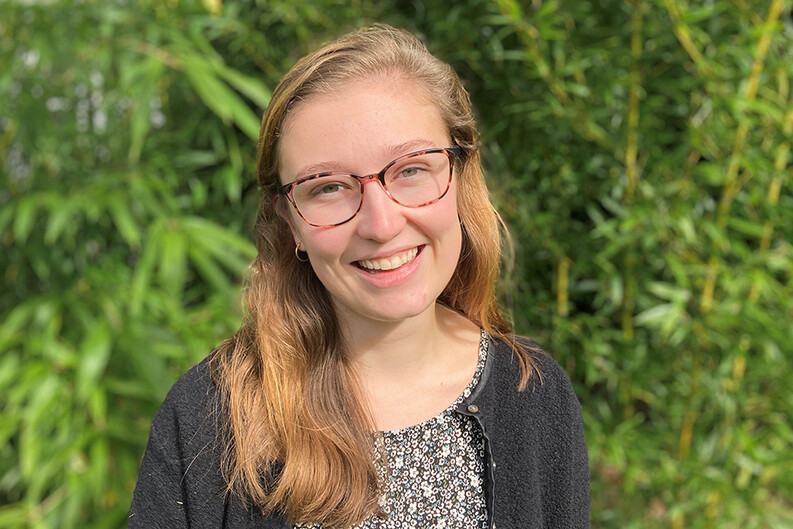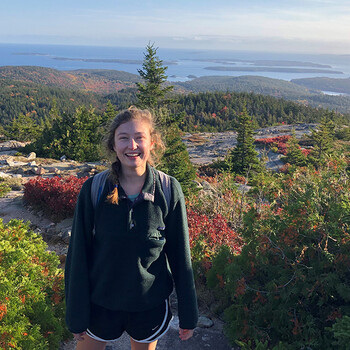Q&A: Liman Fellow Sophie Laing ’21 on Defending Student Loan Borrowers

As a 2021–22 Liman Fellow4, Sophie Laing ’21 works with Pine Tree Legal Assistance in Portland, Maine, to secure relief for borrowers struggling with student loan debt. Laing’s project includes defending borrowers in debt collection proceedings, bringing lawsuits against servicers engaged in unlawful practices, assisting borrowers in federal administrative relief procedures, and providing trainings for community partners on ways to find relief.
Laing received a B.A. in political science and French from Tufts University in 2016. At Yale Law School, she co-directed the HAVEN Medical-Legal Partnership and the Yale Health Law and Policy Society. Through the Housing Clinic, Laing represented homeowners facing foreclosure.
What inspired you to become a Liman Fellow?
Before law school, I worked on access to justice issues in debt collection lawsuits in Massachusetts and Connecticut. I talked to hundreds of defendants who had racked up credit card debt due to mental illness, accidents, or simply to make ends meet. Their debt was often sold to debt buyers who then sought repayment. The defendants I spoke with insisted that they were responsible for this “choice” and felt an obligation to pay back debt buyers who had purchased their debt for pennies on the dollar.

Debt not only weighs on people financially, but also mentally, and can cause extreme stress and shame. This is true when it comes to student loan debt, which has burdened many, from individuals misled by predatory, for-profit schools to borrowers saddled with high-interest and inflexible private student loans to others struggling to find affordable repayment options or navigate possible avenues for relief. Even small student loans can balloon over the years due to interest and late fees. While many people are familiar with student loans through personal experience, and there has been a lot of media attention paid to the issue, options for getting relief from those loans remains opaque. Few are aware that this is a legal issue.
The Liman Fellowship gave me an amazing opportunity to structure a project that best tackles these issues. In Maine, the need for access to relief from student loan debt is felt acutely: the average student debt is the eighth highest in the nation, and 10 percent of borrowers have student loan debt that is in default. Student loan debt has caused people in Maine to move out of state, forgo basic necessities, and postpone saving or investing in the future.
Tell us about a typical day for you at Pine Tree Legal Assistance.
My typical day includes calling clients who have been sued over private student loan debt, developing those cases, consulting colleagues on litigation and research issues, and working with clients through federal avenues for relief. I also work on client education, trying to get the word out, for example, about the end to federal protections for student loan borrowers in February, changes to the Public Service Loan Forgiveness Program, or errors to look for in student loan servicing.
What has been one of the most memorable experiences of your Liman Fellowship so far?
Filing my first papers in court as an attorney was an exciting milestone! It has also been great to connect with other attorneys at Pine Tree and with student loan lawyers across the country. Everyone is dedicated to their work, and it’s a very collaborative environment.
How has your work evolved since you started at Pine Tree in September?
There is always something new to learn about student loans. In the past few months, the Department of Education has announced the extension of COVID protections, modifications to the Total and Permanent Disability Discharge, and major changes to the Public Service Loan Forgiveness Program. The Department of Education is engaged in rulemaking sessions right now, so it is likely that there will be more changes coming out in the near future. Currently, my work is focused on defending students in debt collection lawsuits, but I anticipate it evolving as federal protections end, people try to navigate the Public Service Loan Forgiveness changes, and servicers adjust to requiring payments again in February from borrowers who can’t afford payment.
Which Yale Law School experience prepared you most for this fellowship?
The foreclosure track of the Housing Clinic5 was a great experience. I learned how to develop and litigate cases, represented homeowners in the Attorney for a Day Program, and argued a case at the state appellate level. The clinic made me more confident to step into this role and represent student loan borrowers.
What do you hope to achieve as a Liman Fellow?
In general, I hope to bring clients some relief from their student loan debt, whether that means getting debt collection cases dismissed or favorably settled, getting people access to forgiveness at the federal level, or ensuring servicers place people into the correct repayment programs and do not create worse situations for borrowers. Knowing that there are significant servicing errors and misinformation out there, I also hope to bring affirmative cases under Maine’s Student Loan Bill of Rights. Lastly, a major goal of mine is to promote client education; people don’t see student loans as a legal issue, and small technicalities can make huge differences.
The Arthur Liman Center for Public Interest Law6 promotes access to justice and the fair treatment of individuals and groups seeking to use the legal system. Through research projects, teaching, fellowships, and colloquia, the Liman Center supports efforts to bring about a more just legal system.


